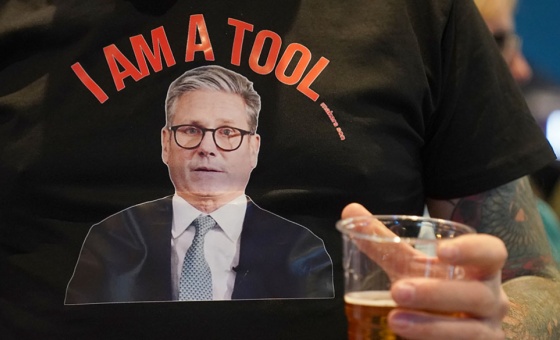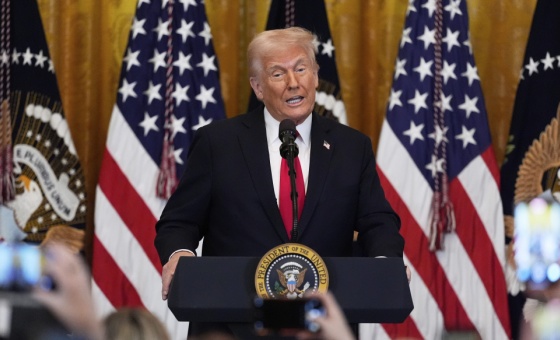This is the last article you can read this month
You can read more article this month
You can read more articles this month
Sorry your limit is up for this month
Reset on:
Please help support the Morning Star by subscribing here
DONALD TRUMP’S loud-mouthed threats to all and sundry are enough to cause anxiety and panic around the world, and especially in near neighbours of the declining superpower he is about to inherit from that master of senile hypocrisy, Joe Biden.
Panic and anxiety are precisely what the orange fascist wants to incite.
The recipe worked like a charm with that pathetic excuse for a national leader, PM Justin Trudeau of Canada, whose craven uninvited trip to Mar-a-Lago to plead with Trump not to slap tariffs on his northern satellite led to brutal humiliation, with the CBC (Canada’s BBC) producing a vicious satirical sketch of Trudeau being treated as a servile puppy.
Mexico’s response could not have been more different, or more effective.
Faced with Trump’s intemperate threats to impose tariffs on Mexican exports, to deport millions of illegal immigrants (Mexicans and others) “starting on day one,” and to classify drug cartels as “terrorists” in order to justify sending US special forces on armed raids into Mexico, President Claudia Sheinbaum sent Trump a public letter on November 26 spelling out to him in no uncertain terms the reality of Mexican-US relations in trade, migration and narcotics control.
She pointed out that migrants from third countries crossing Mexico to reach the US had been reduced by 75 per cent from December 2023 to November 2024 (as shown by US figures), and half of those arrived with a legal appointment under the US CBP One programme.
But what was needed was “a different model of labour mobility” with development assistance to prevent people leaving their countries of origin.
As for fentanyl and other drugs, Mexico had always shown willingness to help; Mexican armed forces and legal agencies had confiscated tons of drugs and arms and arrested tens of thousands of individuals for drug trafficking.
“70 per cent of the illegal weapons seized from criminals in Mexico come from your country; we don’t produce the arms or drugs, but those killed by criminals to supply demand in your country are Mexicans,” Sheinbaum stated.
Migration and drug consumption in the US would not be resolved by threats or tariffs; there must be co-operation and understanding.
A tariff would endanger common enterprises like General Motors, Stellantis and Ford, leading to inflation and job losses in both countries. As for deportations, Mexico would always defend the rights of its citizens.
This clear and firm response produced immediate results: the very next day in the evening Trump said he had an excellent conversation with President Sheinbaum and that she had resolved his concerns about migration, narcotics and trade. He even expressed nostalgia for the good relationship he had with the former president Andres Manuel Lopez Obrador (Amlo).
Of course on social media Trump put his own spin on this, saying that Sheinbaum had promised to stop migrants (which of course was not the case), but the fact that he made a positive response is very significant.
This of course does not mean all has been resolved.
Trump continues to make declarations about mass deportations, and his “Border Czar” Thomas Homan is on record as favouring use of the armed forces to round up and deport illegal immigrants.
Talk continues in the Trump camp about armed raids against “terrorist” cartels. Furthermore, showing that such hysteria is not limited to right-wing Republicans, even the supposedly liberal New York Times recently published a very dubious article claiming to show a fentanyl lab its reporters had visited in Sinaloa.
But Trump and his associates are well aware of the economic chaos that would result from any such disruption of the lucrative trans-border trade.
While the threat to progressive governments and movements from Trump and his billionaire cabal is very real, it is important to distinguish (as far as possible) actual intentions from inflammatory rhetoric.
Yale historian Greg Grandin recently argued that Trump’s threats to annex Canada and Greenland, and retake the Panama Canal, were “red meat” for his political base but not feasible projects.
Canada will continue its craven submission to US policies anyway, and Nato ally Denmark will no doubt respond to pressure to increase its military presence in its Greenland protectorate.
Panama’s right-wing government will continue to grant favourable access to US shipping in the canal without abandoning sovereign control.
As for Mexico, it will face difficult negotiations over the United States-Mexico-Canada [trade] Agreement (USMCA) and possible revisions, but US corporations will ensure continued collaboration in automotive, semi-conductor, energy and agricultural sectors. They cannot afford not to, especially given Mexico’s large-scale public investment in such developments.
Regarding drugs and cartels, the US cannot fail to notice the remarkable success of Mexico’s security strategy, already producing results under Amlo but greatly reinforced under Sheinbaum with her outstanding Public Security Secretary Omar Garcia Harfuch.
On December 4 it was reported that in northern Sinaloa Mexico had confiscated more than a ton of fentanyl, equivalent to 20 million doses worth £323 million, the biggest such seizure ever.
The Mexican Security Department, Armed Forces, National Guard and Solicitor-General’s office have since continued systematic operations with further seizures of drugs and weapons and arrests in Sinaloa, restoring a degree of peace to the state and dealing a massive blow to the cartels.
Similar actions in other states have also brought dramatic results and surely discredit US claims.
US imperialism’s fury against progressive Latin America is clearly bipartisan, as shown by the Biden administration’s recent decisions to establish a base in Ecuador’s ecologically sensitive Galapagos islands and to send 600 troops to bolster the extremely unpopular Boluarte dictatorship in Peru.
What they will achieve other than to increase their already extreme unpopularity in the region is a moot question.
Mexico’s unflinching stand, repeated in recent days by Sheinbaum, has earned praise from across Latin America and the world, and its strong economic and political bargaining position may yet enable cooler heads to prevail.
It has an unrivalled network of 50 consulates in the US prepared to take all possible legal and diplomatic steps to protect its citizens; they may even persuade irate Republicans to negotiate.
David Raby is a retired professor of Latin American history reporting on Mexican affairs, and is Coordinator of the UK Mexico Solidarity Forum; contact him on info@mexicosolidarity.org.uk and on “X” @DLRaby.










